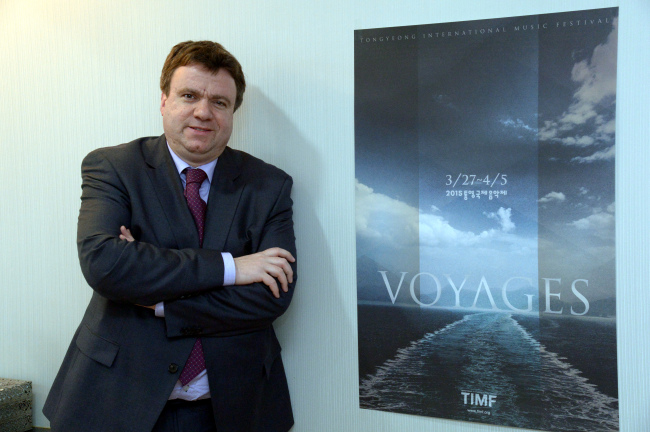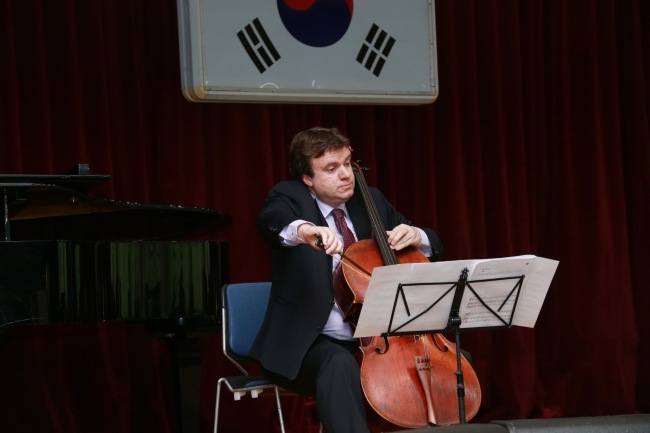Florian Riem helps put Tongyeong on music map
City to seek UNESCO Creative City of Music designation
By Korea HeraldPublished : March 6, 2015 - 19:33
Looking at some artwork on display at the lobby of Ilshin Hall in Hannam-dong while waiting for Florian Riem, CEO of Tongyeong International Music Festival Foundation, to arrive for our interview, I heard a couple of voices speaking in Japanese. Turning around, much to my surprise, I saw Riem, a German, talking in fluent Japanese with his assistant. Perhaps I should not have been so surprised ― his curriculum vitae had said he spent eight years as the assistant principal cellist of Orchestral Ensemble Kanazawa in Japan and three years as a deputy general manager of the same orchestral ensemble.
“I have Korean lessons going. It takes discipline and it is taking time but I will get there,” said Riem who began his 3-year tenure at the TIMFF in January 2014. The Tongyeong Concert Hall hosted its first Tongyeong International Music Festival (TIMF) last year, which, although established in 2002, had been without a proper concert hall.
“I have Korean lessons going. It takes discipline and it is taking time but I will get there,” said Riem who began his 3-year tenure at the TIMFF in January 2014. The Tongyeong Concert Hall hosted its first Tongyeong International Music Festival (TIMF) last year, which, although established in 2002, had been without a proper concert hall.

As the TIMFF CEO, Riem is responsible for the concert hall, the TIMF, the ISANGYUN Competition and a choir. He has the distinction of being the first foreigner to head a concert hall in Korea. In fact, his work also involves artistic planning, administrative work with the City Hall ― the festival’s biggest donor ― and music education for children. “The city has to get its worth. We had 10,000 children in the hall last year and expect to have 15,000 this year,” he said.
In an interview with The Korea Herald at last year’s TIMF, Riem had said that children’s music education would be an important mission for the concert hall. “It gets the parents involved, too, as the children talk about their experience. The aim is to get the people involved,” he noted.
Although Tongyeong is home to many well-known artists, including novelist Park Kyung-li, poet Yu Chi-hwan and, painter Jeong Hyeok-lim, as well as composer Yun I-sang, in whose memory the TIMF is dedicated, the small harbor city is still a cultural backwaters.
Despite its relatively unknown status, the city has big plans for itself. “We plan to apply for the UNESCO Creative City of Music designation and it is really important to make Tyongyeong a music city,” Riem said. Hence the importance of getting locals interested in music.
What sets TIMF apart from other music festivals? “We specialize in new music, support young musicians and venture into the unknown,” Riem said, adding that although its location several hours from major cities could be a disadvantage, the location is what gives the festival its unique character.
“Tongyeong is a special place. It is not just the concerts but the whole experience. I want to host artists who don’t perform in Seoul. We want to be our own musical center.”
The participants in this year’s festival ― one exception being violinist Gidon Kremer ― won’t perform in Seoul.

Another unique aspect of TIMF and the Tongyeong Concert Hall is the emphasis on children’s education. “I ask that the orchestras and musicians performing here also hold concerts for children,” said Riem.
Last year, the Seoul Philharmonic Orchestra performed in Tongyeong and the SPO conductor and pianist Chung Myung-whun gave a free family piano concert and didn’t receive a fee for that, he said. The prestigious St. Petersburg Orchestra also held a family concert.
“I warn the musicians that there will be children and there might be some noise but musicians are open to the idea and do enjoy the experience. It is the administrators who are difficult to convince,” he said, explaining that administrators are wary of making an exception for Tongyeong as they may be asked to do the same by other organizers as well.
The Basel Symphony Orchestra, which is opening the TIMF this year, will also hold a special children’s concert.
This year’s TIMF, March 27-April 5, will be the first bearing Riem’s stamp. Themed “Voyages,” the festival will focus on the life story of Yun as one of continuous voyage, an apt theme since this year marks the 20th anniversary of the composer’s death.
Born in Korea, Yun studied and worked in Europe. In 1969, he was kidnapped from Berlin and sentenced to death in South Korea on charges of spying for North Korea before being released and banned from the country. He became a naturalized German citizen and died in Berlin in 1995.
Voyages also refer to the travel to the different states of mind as reflected in the festival program as well as the actual voyage that will be taken by the Tongyeong Festival Orchestra, which will perform overseas in Japan and Hong Kong for the first time.
Acclaimed violinist Gidon Kremer will perform with the festival orchestra led by conductor Christoph Poppen.
How did Riem manage to get Kremer to perform in Tongyeong, a virtually unknown city on the international classical music scene? “A lot of pulling and arm twisting,” he replied laughing.
Apparently, Riem’s experience directing music festivals in Europe is proving to be pivotal in getting world-class musicians to come to Tongyeong.
This leads to another question: How do you accommodate large orchestras and “sensitive” musicians in a city that does not have luxury accommodations? “That is a difficulty,” Riem agreed but said that the issue will be resolved when a five-star hotel is built next to the concert hall.
As to the question of performing more Yun I-sang pieces at the TIMF ― after all the festival started out as a way to commemorate his achievements as a composer bridging the East and the West ― Riem is taking things slow. He admitted that there were difficulties in performing Yun’s music now for political reasons. Cognizant of the controversy surrounding Yun, he felt it better to make concessions than not to be able to get anything. “The year 2017 marks the centennial of Yun’s birth. We could plan something big for then,” he said.
“There is a way to go till it (TIMF) is really established. I want to make it a unique place. It is a long way.”
In the meantime, Riem is bringing international limelight to Tongyeong. Last year, the city hosted a World Federation of International Music Competitions meeting. In October, the city will be hosting the APEC Arts Centers Association meeting.
“All the heavyweights in culture will be there,” he said.
By Kim Hoo-ran (khooran@heraldcorp.com)
-
Articles by Korea Herald



![[AtoZ into Korean mind] Humor in Korea: Navigating the line between what's funny and not](http://res.heraldm.com/phpwas/restmb_idxmake.php?idx=644&simg=/content/image/2024/04/22/20240422050642_0.jpg&u=)

![[Exclusive] Korean military set to ban iPhones over 'security' concerns](http://res.heraldm.com/phpwas/restmb_idxmake.php?idx=644&simg=/content/image/2024/04/23/20240423050599_0.jpg&u=20240423183955)

![[Herald Interview] Why Toss invited hackers to penetrate its system](http://res.heraldm.com/phpwas/restmb_idxmake.php?idx=644&simg=/content/image/2024/04/22/20240422050569_0.jpg&u=20240422150649)
![[Graphic News] 77% of young Koreans still financially dependent](http://res.heraldm.com/phpwas/restmb_idxmake.php?idx=644&simg=/content/image/2024/04/22/20240422050762_0.gif&u=)







![[Exclusive] Korean military to ban iPhones over security issues](http://res.heraldm.com/phpwas/restmb_idxmake.php?idx=652&simg=/content/image/2024/04/23/20240423050599_0.jpg&u=20240423183955)



![[Today’s K-pop] Ateez confirms US tour details](http://res.heraldm.com/phpwas/restmb_idxmake.php?idx=642&simg=/content/image/2024/04/23/20240423050700_0.jpg&u=)